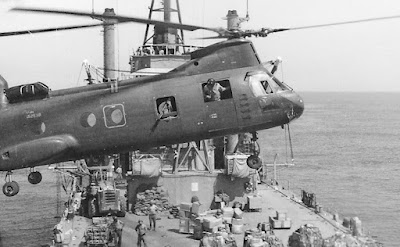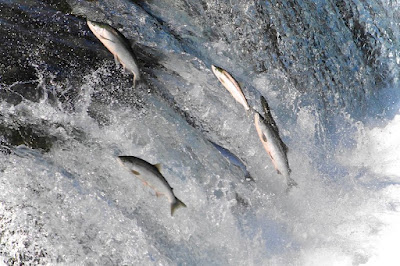 |
| Offloading my ship by helocopter due to enemy ground fire CC Jean Stimmell cc 1967 |
I was mesmerized by a scene I saw on TV at the beginning of the Russian invasion of Ukraine: A group of neighbors with rifles guarding a suburban street leading into Kyiv against approaching tanks, their faces illuminated by fires they had lit in trashcans to keep warm, fearless and immovable, belting out in unison the Ukrainian National Anthem.
When everything is on the line, we forget our differences and come together as one. Of course, we do: as social animals, it has been bred into us. That’s why we have survived as a species.
Although much less dire, I once was in a similar situation in the Navy during the Vietnam War. Our ship shuttled tanks, supplies, and sometimes troops along the coast and up the rivers of Vietnam. Occasionally, we had a significant crew turnover when guys rotated home; on one such occasion, almost a quarter of the crew was new.
On our return trip from the Philippines, all hell broke loose in a crude kind of diversity training, representing as we did, a cross-section of the nation: East coast, highly educated, college dropouts and midwestern kids who hadn’t finished high school; hip city slickers and country folks right off the farm; We had Native American, Hispanic, and black sailors, along with staunch segregationists from the south.
It started with some pushing and shoving, harsh words, and a few fistfights, but, after day after day at sea, a certain equilibrium was achieved. We had other things on our minds. Sometimes, we had to be offloaded by helicopter because of enemy ground fire; once, shuttling around the Mekong Delta, the crew didn’t set foot on dry land for three months while garbage mounted up in the 120-degree heat, and we were reduced to saltwater showers.
We were a scruffy lot but did our jobs like well-oiled machines. If we got stuck on a sand bar in a river, we lowered landing boats to push us free. And it was up to us to defend our own perimeter when offloading cargo solo at desolate spots in the jungle.
On November 1, 1968, shortly after I had returned to civilian life, Vietcong divers partially sunk our ship on the My Tho River. According to the official records, the 25 killed in action in the mining of Westchester County were “the U.S. Navy’s greatest single-incident combat loss of life during the entire Vietnam War.”1 The death toll could have been much worse! But reacting quickly, amidst the screams of the injured in pitch-black darkness, crew rose to the occasion, turning valves to pump water into ballast tanks, preventing the ship from capsizing.
Staying alive in Vietnam was a mighty unifying force, putting on hold the cultural war raging back home in America. Today we are at war again – and I’m not talking about Russia, or our cultural polarization, which, while severe, is only a symptom of a deeper problem: the autocracy that rules our nation.
Like Russia, we have our own super-rich oligarchs: At the top of the list, according to Forbes, are Elon Musk, Jeff Bezos, and Bill Gates, who now own more wealth than half of our population.2 Worse yet “ProPublica found [in most] recent years, Musk, Bezos, and many of their fellow billionaires paid zero federal income taxes even as their fortunes soared.”3
Like oligarchs everywhere, their unlimited resources enable them to tip elections in their favor. Conversely, as confirmed by Pew research, the average citizen has virtually no influence. Dark money and the fossil fuel industry spare no expense in shifting the blame away from themselves for causing our nation’s massive inequality – and the existential dangers of climate change – by spreading propaganda, distrust, and polarization.
These corporate titans now pit populists against progressives in the same manner that plantation owners pitted poor whites against blacks – while the elite merrily made money off both groups. Today the war we must fight is against this rampant inequality and looming environmental disaster.
That's the new war we must fight. Like the Ukrainians are doing, we must stand shoulder to shoulder to stop it. Our families and loved ones are on the line, along with all our fellow inhabitants of Space Ship Earth.
xxx
1 https://www.historynet.com/uss-westchester-county-attacked-during-the-vietnam-war/
2 https://en.wikipedia.org/wiki/List_of_wealthiest_Americans_by_net_worth1
3 https://www.thenation.com/article/economy/pandemic-rich-richer/?utm_source=Sailthru&utm_medium=email&utm_campaign=Daily%203.22.2022&utm_term=daily


















